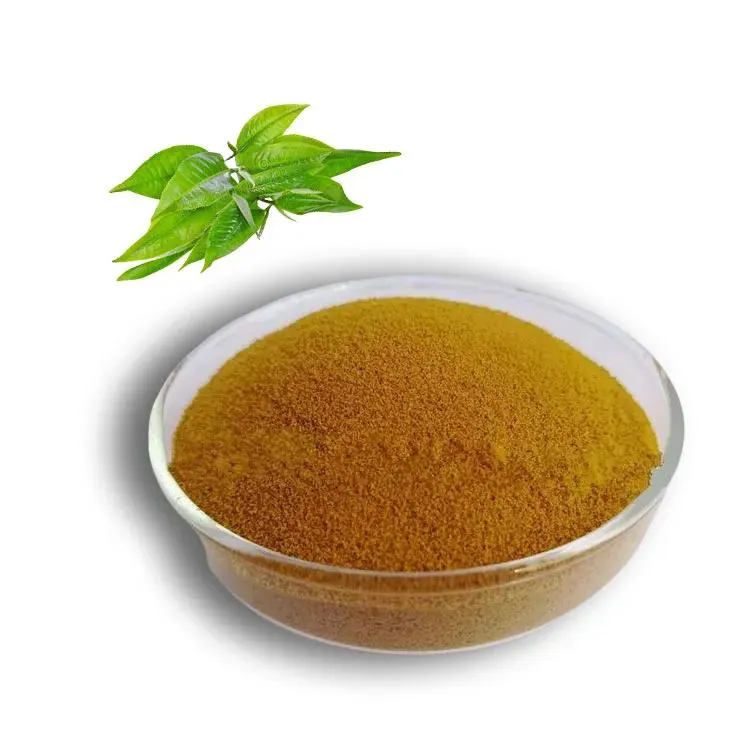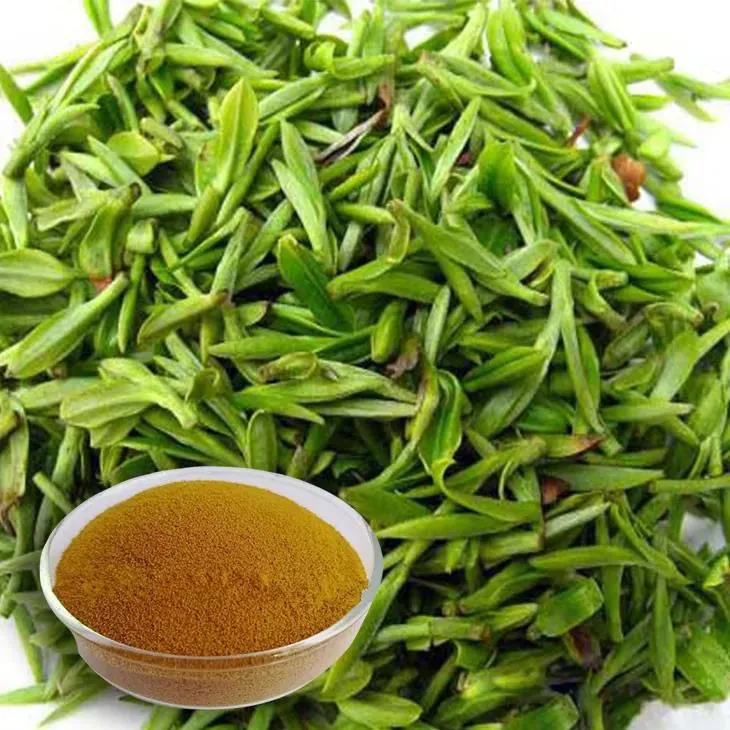- 0086-571-85302990
- sales@greenskybio.com
Use green tea extract to prevent diseases and enhance immunity.
2024-11-14

1. Introduction: The Significance of Green Tea in Different Cultures
Green tea has a long - standing and rich history in various cultures around the world. In Asian cultures, especially in China and Japan, green tea has been consumed for centuries, not just as a beverage but also as an important part of traditional medicine.
In China, green tea was highly regarded in ancient times. It was often used in traditional Chinese medicine to soothe the body, improve digestion, and clear the mind. The practice of drinking green tea was deeply ingrained in daily life, and it was also offered as a sign of hospitality during social gatherings.
In Japan, the tea ceremony, known as "chanoyu" or "sado," is a highly refined and ritualized form of green tea consumption. The ceremony emphasizes harmony, respect, purity, and tranquility. Green tea in this context is not only a drink but also a medium for cultural expression and spiritual pursuit.
These traditional uses of green tea in different cultures provide a strong foundation for modern research on its potential health benefits, including its role in disease prevention and immunity enhancement.

2. Scientific Investigations on Green Tea Extract's Properties
2.1 Antioxidant Properties
One of the most well - studied properties of Green Tea Extract is its antioxidant capacity. Antioxidants play a crucial role in protecting the body from oxidative stress, which is caused by an imbalance between the production of reactive oxygen species (ROS) and the body's ability to detoxify them.
Green tea contains polyphenols, such as catechins, which are powerful antioxidants. The most abundant catechin in green tea is epigallocatechin - 3 - gallate (EGCG). Studies have shown that EGCG can scavenge free radicals, which are highly reactive molecules that can damage cells, DNA, and proteins. By neutralizing these free radicals, Green Tea Extract helps to prevent oxidative damage that can lead to various diseases, including cancer, heart disease, and neurodegenerative disorders.
Research has also demonstrated that the antioxidant properties of green tea extract can enhance the function of the body's antioxidant defense system. This includes increasing the activity of antioxidant enzymes such as superoxide dismutase (SOD), catalase (CAT), and glutathione peroxidase (GPx). These enzymes work together to break down ROS and maintain the redox balance in the body.
2.2 Antimicrobial Properties
Green tea extract has also been found to possess antimicrobial properties. It can inhibit the growth of a wide range of microorganisms, including bacteria, viruses, and fungi.
In the case of bacteria, studies have shown that green tea extract can disrupt the bacterial cell membrane, interfere with bacterial metabolism, and inhibit bacterial replication. For example, it has been effective against common pathogenic bacteria such as Escherichia coli, Staphylococcus aureus, and Salmonella typhimurium. This antimicrobial activity makes green tea extract a potential natural alternative to conventional antibiotics, especially in the face of the growing problem of antibiotic resistance.
Regarding viruses, green tea extract has been shown to have antiviral effects against several viruses. It can interfere with the virus - host cell interaction, prevent viral entry into cells, and inhibit viral replication once inside the cell. For instance, it has shown promise in inhibiting the influenza virus and herpes simplex virus.
When it comes to fungi, green tea extract can inhibit the growth of fungal species such as Candida albicans. This antifungal property may be useful in treating fungal infections, especially those that are difficult to treat with conventional antifungal drugs.
2.3 Anti - inflammatory Properties
Another important property of green tea extract is its anti - inflammatory effect. Inflammation is a natural immune response of the body to injury or infection. However, chronic inflammation can contribute to the development of many diseases, such as arthritis, diabetes, and cardiovascular diseases.
Green tea extract can modulate the inflammatory response by inhibiting the production of inflammatory mediators. These mediators include cytokines such as interleukin - 1β (IL - 1β), interleukin - 6 (IL - 6), and tumor necrosis factor - α (TNF - α), as well as prostaglandins and leukotrienes. By reducing the levels of these inflammatory mediators, green tea extract helps to dampen the inflammatory response and prevent chronic inflammation.
Studies have also shown that green tea extract can regulate the activity of immune cells involved in the inflammatory process. For example, it can modulate the function of macrophages, which are key immune cells that play a role in both inflammation and immunity. By influencing the behavior of macrophages, green tea extract can promote a more balanced immune response.

3. The Link between Green Tea Extract's Properties and Disease Prevention
The antioxidant, antimicrobial, and anti - inflammatory properties of green tea extract are closely intertwined with its ability to prevent various diseases.
In cancer prevention, the antioxidant property of green tea extract is of great significance. Oxidative stress can damage DNA and lead to mutations that can initiate cancer. By scavenging free radicals and reducing oxidative damage, green tea extract can help prevent the development of cancer. Additionally, its anti - inflammatory effect may also play a role in inhibiting the growth and spread of cancer cells. Some studies have suggested that green tea extract may be particularly effective in preventing cancers of the breast, prostate, and colon.
For heart disease prevention, the antioxidant and anti - inflammatory properties of green tea extract are crucial. Oxidative stress and inflammation are key factors in the development of atherosclerosis, which is a major cause of heart disease. Green tea extract can help prevent the oxidation of low - density lipoprotein (LDL) cholesterol, which is a key step in the formation of atherosclerotic plaques. By reducing inflammation, it can also help to stabilize existing plaques and prevent them from rupturing, which can lead to heart attacks or strokes.
In the prevention of neurodegenerative diseases such as Alzheimer's and Parkinson's diseases, the antioxidant and anti - inflammatory properties of green tea extract are also beneficial. These diseases are characterized by oxidative damage and chronic inflammation in the brain. Green tea extract can penetrate the blood - brain barrier and exert its antioxidant and anti - inflammatory effects in the brain, thereby protecting neurons from damage and potentially delaying the onset of these diseases.

4. The Role of Green Tea Extract in Immunity Enhancement
Green tea extract can enhance the body's immune system in multiple ways.
Firstly, as mentioned earlier, its antioxidant property helps to protect immune cells from oxidative damage. Immune cells, such as lymphocytes and macrophages, are constantly exposed to ROS during their normal function. By reducing oxidative stress, green tea extract can maintain the integrity and function of these immune cells, enabling them to better perform their immune defense tasks.
Secondly, the anti - inflammatory effect of green tea extract can help to regulate the immune response. An overactive or dysregulated immune response can lead to autoimmune diseases or excessive inflammation. By modulating the production of inflammatory mediators and the activity of immune cells, green tea extract can promote a more balanced and appropriate immune response.
Finally, the antimicrobial property of green tea extract directly contributes to the body's defense against pathogens. By inhibiting the growth of bacteria, viruses, and fungi, it reduces the burden on the immune system and allows it to focus on other potential threats.
5. Practical Applications of Green Tea Extract
Green tea extract has a wide range of practical applications in promoting health and preventing diseases.
- Dietary Supplements: Green tea extract is available in the form of dietary supplements, such as capsules, tablets, and powders. These supplements are often used by people who want to boost their antioxidant intake, enhance their immune system, or support overall health. However, it is important to note that the quality and purity of these supplements can vary, and it is advisable to choose products from reliable manufacturers.
- Cosmetics: Due to its antioxidant and anti - inflammatory properties, green tea extract is also used in cosmetics. It can be found in skin creams, lotions, and serums. Green tea extract in cosmetics is claimed to help protect the skin from environmental damage, reduce inflammation, and improve skin health. It may also have anti - aging effects by preventing oxidative damage to skin cells.
- Functional Foods: Green tea extract can be incorporated into functional foods. For example, some energy bars, beverages, and snacks may contain green tea extract as an added ingredient to provide health benefits. These functional foods can be a convenient way for consumers to obtain the benefits of green tea extract while enjoying their regular diet.
6. Potential Side - Effects of Green Tea Extract
While green tea extract has many potential health benefits, it may also have some side - effects, especially when consumed in large amounts or in certain individuals.
- Caffeine - related Effects: Green tea contains caffeine, and green tea extract may also have caffeine content. Excessive consumption of green tea extract can lead to caffeine - related side - effects such as insomnia, jitters, and increased heart rate. People who are sensitive to caffeine or have certain medical conditions, such as heart problems or anxiety disorders, should be cautious when using green tea extract.
- Liver Toxicity: In some rare cases, high - dose or long - term use of green tea extract has been associated with liver toxicity. However, this is more likely to occur with very high - dose supplements or in individuals with pre - existing liver conditions. It is important to follow the recommended dosage guidelines and consult a healthcare provider if there are any concerns.
- Interactions with Medications: Green tea extract may interact with certain medications. For example, it can interfere with the absorption or metabolism of some drugs, such as blood thinners and medications for high blood pressure. Therefore, if you are taking any medications, it is essential to consult your doctor before using green tea extract to avoid potential drug - interactions.
7. Future Research Directions
Despite the extensive research on green tea extract, there are still many areas that require further investigation.
- Mechanisms of Action: While the antioxidant, antimicrobial, and anti - inflammatory properties of green tea extract are well - known, the detailed molecular mechanisms underlying these effects are not fully understood. Future research could focus on elucidating these mechanisms at a deeper level, which could lead to the development of more targeted and effective therapies based on green tea extract.
- Clinical Trials: More large - scale clinical trials are needed to confirm the effectiveness of green tea extract in preventing specific diseases and enhancing immunity in humans. These trials should be well - designed, with appropriate control groups and long - term follow - up, to provide more reliable evidence.
- Optimal Dosage and Formulation: Determining the optimal dosage and formulation of green tea extract for different health benefits is an area that requires further research. Different forms of green tea extract, such as different concentrations of catechins or different delivery systems, may have varying levels of efficacy. Understanding the optimal dosage and formulation could help to maximize the health benefits while minimizing potential side - effects.
8. Conclusion
Green tea extract has shown great potential in disease prevention and immunity enhancement through its antioxidant, antimicrobial, and anti - inflammatory properties. Its traditional use in different cultures provides a historical basis for modern research, and scientific investigations have further elucidated its multiple beneficial effects. However, like any natural product, it has potential side - effects, and more research is needed to fully understand its mechanisms of action, optimize its use, and confirm its effectiveness in clinical settings. Overall, green tea extract represents a promising area of research and a potential natural approach to maintaining health and preventing diseases.
FAQ:
What are the main traditional uses of green tea in different cultures?
Green tea has been used in many cultures for centuries. In Asian cultures like China and Japan, it has been a popular beverage in daily life and also used in traditional medicine. It was often consumed for its potential to promote relaxation, digestion, and mental clarity. In some traditional medicine practices, it was used to treat minor ailments such as headaches and fatigue.
How do the antioxidant properties of green tea extract help in disease prevention?
The antioxidant properties of green tea extract are very important for disease prevention. Antioxidants can neutralize free radicals in the body. Free radicals are unstable molecules that can damage cells and DNA, which may lead to various diseases like cancer, heart disease, and neurodegenerative diseases. By scavenging these free radicals, green tea extract helps protect cells from oxidative damage, reducing the risk of developing these diseases.
What are the antimicrobial effects of green tea extract?
Green tea extract has antimicrobial effects. It can inhibit the growth of various microorganisms such as bacteria, viruses, and fungi. For bacteria, certain components in green tea extract can disrupt their cell membranes or interfere with their metabolic processes, preventing their growth and reproduction. In the case of viruses, it may block the virus from attaching to host cells or inhibit viral replication inside the cells.
Can green tea extract really enhance the immune system? How?
Yes, green tea extract can enhance the immune system. Its anti - inflammatory properties play a role in this. Chronic inflammation can suppress the immune system. Green tea extract reduces inflammation, allowing the immune system to function better. Also, its antioxidant properties protect immune cells from damage, and some of its bioactive compounds can stimulate the production and activity of immune cells like lymphocytes and macrophages.
What are the potential side - effects of using green tea extract?
While green tea extract is generally considered safe for most people, it can have some potential side - effects. High doses may cause problems such as nausea, vomiting, and stomach upset due to its caffeine and tannin content. In some cases, it may also interact with certain medications, for example, it can interfere with the absorption of iron. People with certain medical conditions like liver disease or bleeding disorders should be cautious when using green tea extract.
Related literature
- The Health Benefits of Green Tea: An Overview"
- "Green Tea Extract and Immune Function: Current Research"
- "Antioxidant Properties of Green Tea: Implications for Disease Prevention"
- ▶ Hesperidin
- ▶ citrus bioflavonoids
- ▶ plant extract
- ▶ lycopene
- ▶ Diosmin
- ▶ Grape seed extract
- ▶ Sea buckthorn Juice Powder
- ▶ Beetroot powder
- ▶ Hops Extract
- ▶ Artichoke Extract
- ▶ Reishi mushroom extract
- ▶ Astaxanthin
- ▶ Green Tea Extract
- ▶ Curcumin Extract
- ▶ Horse Chestnut Extract
- ▶ Other Problems
- ▶ Boswellia Serrata Extract
- ▶ Resveratrol Extract
- ▶ Marigold Extract
- ▶ Grape Leaf Extract
- ▶ blog3
- ▶ blog4
- ▶ blog5
-
Organic Tongkat Ali extract powder factory.
2024-11-14
-
How to make powder with ashwagandha extract.
2024-11-14
-
Rosehip extract manufacturers from China.
2024-11-14
-
The best cat's claw extract in nature.
2024-11-14
-
Chinese Dandelion Leaf Extract Suppliers.
2024-11-14
-
Peppermint Oil
2024-11-14
-
Hedyotis Diffusa Extract
2024-11-14
-
Phellodendron Extract
2024-11-14
-
Shikonin
2024-11-14
-
Alfalfa Meal
2024-11-14
-
Camu Camu Extract
2024-11-14
-
Plantain extract
2024-11-14
-
Lily extract
2024-11-14
-
Chia Seed Powder
2024-11-14
-
Horse Chestnut Extract
2024-11-14





















